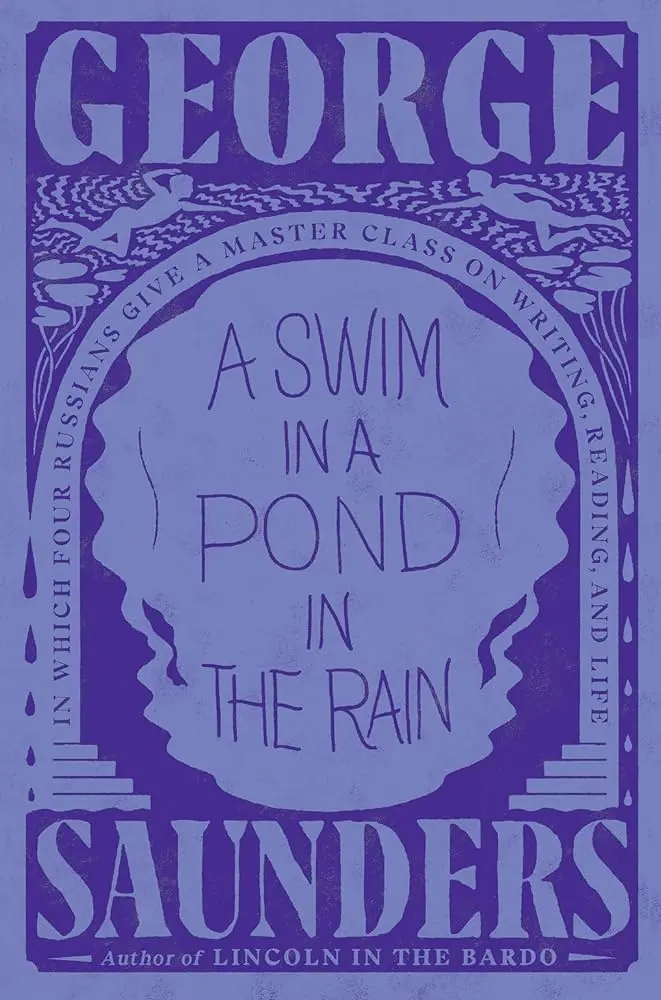A Swim in a Pond in the Rain: Dive Into Literary Wisdom
An Invitation to Saunders’ Classroom
Imagine being in a cozy, intellectual space where George Saunders, acclaimed author and professor, dissects classic Russian short stories. “A Swim in a Pond in the Rain” offers precisely this experience. It’s a blend of literary critique, writing advice, and personal anecdotes, making it a captivating read for both aspiring writers and literature enthusiasts. Saunders brings his 20 years of teaching experience into this book, providing readers with an intimate look at the intricacies of storytelling through the works of Chekhov, Tolstoy, Turgenev, and Gogol.
Saunders’ approach is refreshingly conversational. He avoids the pitfalls of dense academic jargon, opting instead for a style that feels more like a friendly chat over coffee. This accessibility is one of the book’s greatest strengths, making complex literary concepts digestible even for those who might not typically delve into literary analysis. His warm, humorous tone invites readers to explore these stories with curiosity and openness, much like students in his Syracuse University classroom.
The inclusion of seven complete stories by the Russian masters allows readers to engage with the material directly. Saunders doesn’t just tell you what to think about these stories; he provides the texts and then guides you through his analysis, encouraging you to form your own interpretations. This method not only deepens your understanding of the stories themselves but also enhances your appreciation for the art of storytelling.
Conversational and Insightful
What’s striking about this book is Saunders’ conversational style. He writes as if he’s talking directly to you, sharing his passion for literature without pretense. This approachable tone makes the book not just informative but also deeply engaging. You feel like you’re part of a warm, insightful conversation rather than a dry lecture. His reflections are filled with personal anecdotes and insights, making the reading experience both enlightening and enjoyable.
Saunders’ analyses are a blend of technical and moral insight. He dissects the mechanics of writing, such as plot structure and character development, but also delves into the ethical and philosophical dimensions of these stories. For instance, when discussing Tolstoy’s “Master and Man,” Saunders explores themes of social inequality and sacrifice, illustrating how Tolstoy’s narrative choices reflect deeper moral questions. This dual focus on technical craft and thematic depth enriches the reader’s understanding and appreciation of these classic works.
One of the most valuable aspects of Saunders’ approach is his ability to make connections between the Russian stories and contemporary life. He shows how the themes and techniques used by these 19th-century authors remain relevant today. Whether discussing the subtleties of Chekhov’s characterizations or the satirical brilliance of Gogol, Saunders provides insights that are both timeless and timely, demonstrating the enduring power of great storytelling.
Learning from the Masters
The book includes seven complete stories by Russian greats—Chekhov, Turgenev, Tolstoy, and Gogol. Saunders doesn’t just present these stories; he dissects them, revealing what makes them great. His analyses are practical and insightful, making the intricacies of these stories accessible to all readers. He highlights elements like plot structure, character development, and thematic depth, providing valuable lessons for anyone interested in storytelling.
For example, Saunders’ examination of Chekhov’s “In the Cart” reveals how Chekhov plays with reader expectations and subverts traditional narrative techniques. He discusses the story’s minimalism and how Chekhov uses small details to convey larger truths about human nature and societal norms. This kind of detailed analysis helps readers understand not just the ‘what’ of the story, but the ‘how’ and ‘why’ behind its construction, offering a deeper appreciation for Chekhov’s craft.
In discussing Turgenev’s “The Singers,” Saunders explores the story’s use of descriptive excess and its impact on pacing and atmosphere. He notes how Turgenev’s seemingly meandering descriptions build a rich, immersive world that enhances the emotional resonance of the narrative. This focus on the technical aspects of storytelling, coupled with Saunders’ personal reflections, provides a comprehensive guide to understanding and appreciating these literary works.
Practical Advice for Writers
Beyond literary analysis, Saunders offers nuggets of wisdom for writers. He shares his own experiences and writing processes, including the importance of revision and the art of omission. His advice is grounded in decades of teaching and writing, making it both practical and profound. Whether you’re a seasoned writer or just starting out, you’ll find his guidance incredibly useful.
Saunders emphasizes the importance of revision, likening it to a sculptor refining their work. He describes his own painstaking process of rewriting and fine-tuning his stories, offering readers a glimpse into the labor and dedication required to produce high-quality fiction. This candid look at the writing process demystifies the craft and provides aspiring writers with realistic expectations and valuable techniques to improve their own work.
He also delves into the moral dimensions of writing, discussing how ethical considerations influence narrative decisions. Saunders argues that good storytelling involves more than technical proficiency; it requires a deep engagement with the moral implications of one’s work. This perspective encourages writers to think critically about the impact of their stories and to strive for authenticity and integrity in their writing.
A Personal Journey
Saunders’ personal reflections add a rich layer to the book. He talks about his journey as a writer and teacher, providing a glimpse into his own creative process. This personal touch makes the book more than just a guide to literature; it’s a journey through Saunders’ mind and his deep love for these Russian stories. His anecdotes about teaching and writing offer both inspiration and practical advice, making the book a valuable resource for readers and writers alike.
For instance, Saunders shares stories from his own classroom experiences, illustrating how his students’ insights have shaped his understanding of these Russian classics. These anecdotes provide a behind-the-scenes look at the collaborative nature of literary analysis and highlight the importance of community and dialogue in the learning process. By sharing his own journey, Saunders invites readers to join him on a path of discovery and growth, both as readers and as writers.
Moreover, his reflections on the personal impact of these stories underscore the transformative power of literature. Saunders discusses how engaging deeply with these texts has influenced his own worldview and creative practice, demonstrating the profound connections between reading, writing, and living. This personal dimension adds depth and richness to the book, making it a compelling read for anyone interested in the intersection of literature and life.
Final Thoughts
Whether you’re looking to improve your writing or deepen your understanding of literature, this book is a treasure trove of insights and inspiration. So, if you’re ready to explore the depths of Russian literature with a masterful guide, dive into this book and let Saunders lead the way.
This book is a must-read for anyone passionate about storytelling, offering both practical advice and deep philosophical insights. Saunders’ unique blend of personal reflection, literary analysis, and writing guidance makes “A Swim in a Pond in the Rain” a standout work that will resonate with readers long after they’ve turned the last page. So, grab a copy, find a comfortable spot, and prepare to be immersed in the rich world of Russian literature and the art of storytelling.
Subscribe to our newsletter and get a free novel each month!



